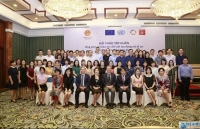
Why are they intolerantly leaving homeland?
Latest
| TIN LIÊN QUAN | |
| Vietnam to simplify e-passport issuance | |
| New Zealand: Vietnamese sailors did not violate law | |
Sad, mournful, regretful,… That is the true feelings of almost everyone who heard about this information. The international media is flooded with general and uncertain information about the victims’ nationality, including the screenshot of messages which were alledgedly sent to her mother by a girl who was breathing her last due to exhaustion.
However, the premonition of families in Yen Thanh district, Nghe An province, whose relatives have been looking for a “paradise” in the West, showed that their children may met with an accident on the fateful truck.
 |
| The international community was shocked by the death of a Syrian boy who along with 23 others tried to immigrate into the Kos island, Greece. (Photo: Reuters) |
On my journeys abroad, I met many Vietnamese people who left their hometowns for a number of specific reasons, but everyone shared the same explanation: “Working abroad can make more money but it is extremely difficult”.
I remembered a small woman whose eyes were wet with tears at Bangkok’s airport to find the transit waiting area to fly to Qatar 5 years ago. She was brought to Qatar legally, but owing a very little foreign language capacity, she always held in her hand a piece of paper in which basic information and simplest conversational sentences were written down.
The anxiety appeared on every wrinkle on the austere face of over-40-year-old woman who have never visited a big city before. But at that time, she had to go work abroad.
I was obsessed with the story that she had to tore herself away her 10-year-old daughter to enter airport’s security check area, did not dare to look back while her daughter’s voice of crying was becoming weaker…
We should not ask the question, “Why are they leaving their homelands despite risks and pitfalls?”. Migration is the departure of hope for a better life than available one. It has been the story of mankind for thounsands of years. In the era of globalization, migration became an irreversible trend. Migrants often move from underdeveloped countries to more developed ones.
The hope of changing life, mainly in term of economic conditions, has urged them to rely on hazard journeys which brought about two results: success or death. That is the cost of choice.
Instead, we shoud ask, “What should we do to keep they stay at the homeland?”. Improving living standards and economic growth are definitely essential but not enough.
The illusion of a rich life and a life-changing income and inspiring images from the media, movies and words of mouth in the community, led individuals to the path of illegal migration although some of them were aware of risks.
In the recent high school graduation examination, when having a chance to invigilate at a high school in Phu Tho province, I asked students what they would do after graduation. Most male students said they would like to be blue-collar workers abroad.
I continued asking that what would be better if they work abroad in comparison with Vietnam. The students did not know thoroughly and just listened to the foregoers who said they would spend a sum of money to support parents at home.
Listening to the words of those who has already gone abroad is all the students know about the work in foreign countries. The dark sides of developed countries such as crime, terrorism, slave working conditions of immigrants, sexual slavery, drug addiction,… are what people in poor villages may never imagine, or may know but eventually decide to bet on luck.
The Vietnamese people have an inherent conception that working abroad is definitely better in the homeland. That conception has not been changed so far. The change of that way of thinking requires a higher political determination, from policies to total solutions in many aspects.
Ly Yen is a senior lecturer of international communication at the Diplomatic Academy of Vietnam. The opinions are her own.
 | Japan continues to be largest market of Vietnamese workers Japan remained the largest market for Vietnamese guest workers in the first nine months of 2019, according to the Department of Overseas Labour under the ... |
 | Vietnamese diplomats learned new skills to boost the rights of women migrant workers Today, more than 100 Vietnamese diplomats have gathered in Ha Noi to acquire new skills on how they can better support women migrant workers subject ... |
 | More than 96,000 foreigners granted e-visa in past nine months As many as 96,478 foreigners requested and received e-visas in the past nine months (since February 1), including 93,266 that accessed the application system by ... |

















